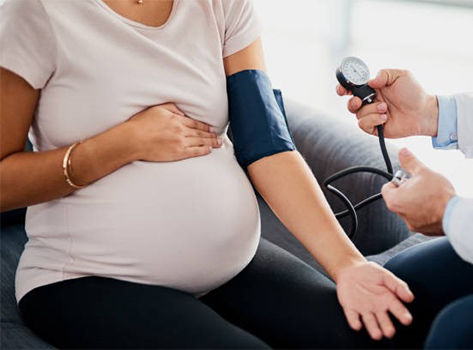A woman’s body works hard during pregnancy. Blood volume nearly doubles, which causes the heart rate to increase by 10 to 20 beats per minute.
For most moms-to-be, this stress is a natural part of pregnancy and well tolerated. But for others, a serious type of high blood pressure called preeclampsia can develop, which, if not properly managed, can become life-threatening for both mother and baby.
“There are three types of hypertension (high blood pressure) that require management, and all three are on the rise during pregnancy,” says Dr. Amy Ahnert, MD, director of the Women’s Heart Program for Atlantic Health System. “That’s why it is so important for pregnant women to closely track their blood pressure throughout their pregnancy to prevent serious health complications.”
When high blood pressure becomes dangerous
Your blood pressure measures the force of blood as it pushes against your artery walls. Excessive force can cause three types of hypertension (high blood pressure) during pregnancy:
- Chronic hypertension is when a woman has high blood pressure before becoming pregnant or develops it before 20 weeks of gestation. This can increase the risk of developing preeclampsia.
- Gestational hypertension is high blood pressure that develops after 20 weeks of pregnancy. It needs to be monitored because it can also progress to preeclampsia.
- Preeclampsia is a serious condition in which dangerously high blood pressure can affect the kidneys, liver, brain, lungs, heart, and eyes. Preeclampsia usually begins after 20 weeks of pregnancy and can be life-threatening.
Hypertension during pregnancy can lead to long-term heart disease
Dr. Ahnert explains that in recent studies from the American Heart Association, women with preeclampsia during pregnancy have a two-to-four-times greater risk of developing chronic hypertension, heart disease, stroke, and diabetes in their lifetime—particularly within ten years of giving birth.
“New research shows that preeclampsia can lead to a lifelong increased risk of cardiovascular disease for mother and baby,” says Dr. Ahnert. “We used to think that preeclampsia only affected a woman’s risk during pregnancy, but now we know it actually carries residual risk for women beyond pregnancy.”
Dr. Ahnert recommends that any woman with a history of preeclampsia get regularly screened throughout her lifetime under the guidance of a cardiologist.
“Many women know the traditional risk factors for heart disease like smoking, high cholesterol, or diabetes,” she says. “But unfortunately, many women are not informed that preeclampsia is also a risk factor for heart disease. The good news is that with proper surveillance and treatment, heart disease is preventable.”
Monitoring your blood pressure during pregnancy
An obstetrician monitors your blood pressure at each prenatal visit. If you’ve been diagnosed with chronic or gestational hypertension, or preeclampsia, you should also be seeing a cardiologist regularly and be tracing your readings with a home blood pressure monitor.
“Because preeclampsia can lead to serious life-threatening complications, it is imperative for women to tell their doctor about any symptoms during and even after pregnancy,” says Dr. Ahnert.
“Headaches, blurry vision, swelling, abdominal pain, and shortness of breath are only a few of the symptoms that can signal a serious problem. Women must also know that preeclampsia can develop after they’re discharged from the hospital. So, any unusual symptoms need to be reported immediately to their health care team.”
Be proactive about health
To stay safe and healthy, it's good to have a primary care provider who knows and understands your health history and wellness goals.













